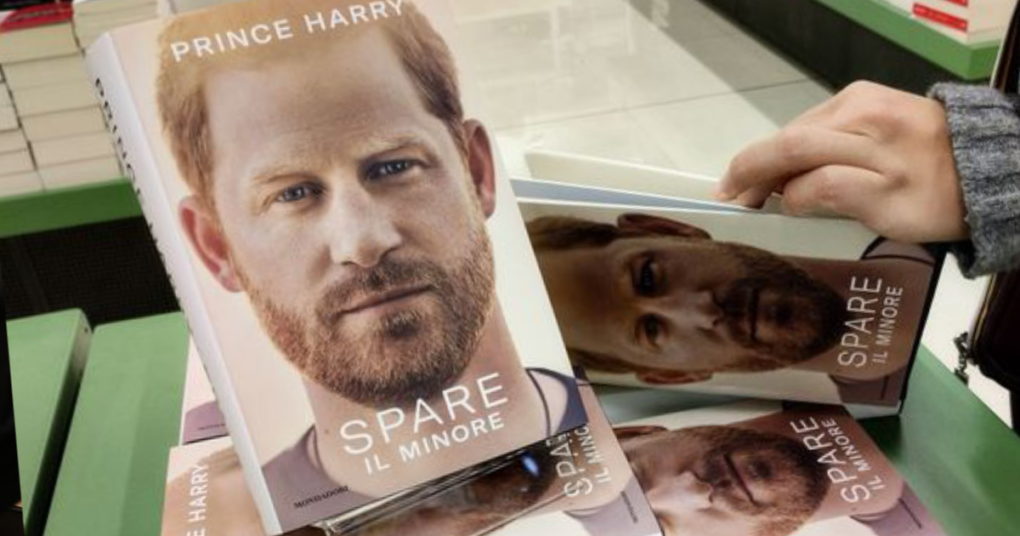Spare
Prince Harry The Duke of Sussex
Random House
2023
416 pages
ISBN 978-0593593806
Following years of public self-pity from Harry and Meghan, the title chosen by the Duke of Sussex for his newly-released autobiography, Spare, needs little interpretation. But just how long a bow Prince Harry draws with this imagery is something to behold.
In explaining his memoir’s title, Harry establishes that his older brother “Willy was the Heir, whereas I was the Spare,” then remonstrates:
I was the shadow, the support, the Plan B. I was brought into the world in case something happened to Willy. I was summoned to provide back-up, distraction, diversion and, if necessary, a spare part. Kidney, perhaps. Blood transfusion. Speck of bone marrow.
Spare parts? Spare me.
I am familiar with self-pity and have engaged in the sorry practice on more occasions than I care to admit. But a privileged prince like Harry playing victim — for book deals and ever more global spotlight — is beyond the pale. As Megan Basham of the Daily Wire has opined:
Prince Harry is proof that no matter how much privilege you are born into, no matter how much material wealth you are blessed with, you can still convince yourself you are a victim. The pull to cast oneself as a perpetually injured party, deserving of the world’s pity, is that strong.
To be fair, privilege and wealth have not shielded Harry Windsor from tragedy. In a more sympathetic analysis, Julia Baird in the Sydney Morning Herald writes:
One of the more troubling aspects of the recent “soul unburdening” in Harry’s brilliantly titled new book, Spare, is how obvious, enduring and defining the trauma of his mother’s death is for him today. How in many ways, he is still that sad 12-year-old who, as he writes, felt numb as he walked to Westminster Abbey behind his mother’s coffin, face flushed, fists clenched …
I find it hard not to view him from the viewpoint of a mother who’d like to whisk him away from the cameras, wrap him in love and talk sense to him. Help him to sort things out with his brother and encourage him to be honest but loyal. Talk about what forgiveness might look like. Tell him to take responsibility for his own actions.
In these paragraphs at least, Baird strikes the right tone. Harry is hurt and needs help — but increasingly, his pain is self-inflicted and is therefore supremely avoidable.
Having married his princess, relinquished his royal duties, found a new life abroad and been through therapy, surely Harry has more important goals in life than slinging mud at his family and burning his last remaining bridges? Victimhood is a poor look on a prince. As another opinion columnist put it, this time in the Globe and Mail:
What Spare seeks to accomplish is to translate the life experience of a Prince who has spent much of his life carousing – a man whose life makes everyday white male privilege seem paltry – into the story of a victim of systemic forces.
This writer, too, expressed mixed feelings:
Spare left me feeling genuine compassion for Harry, mingled with a queasy sense of shame for this tawdry era. Another time and culture might have afforded a man such as he an honourable life of leadership, even heroism. Instead, the 21st century has turned him into a broken reciter of Hallmark-tier therapy platitudes, hell-bent on strip-mining what’s left of public affection for him in fruitless pursuit of the empathy he clearly craves.
Harry provides only the latest proof that the woke worldview has nothing to impart but resentment and nowhere to grow but inward. What a contrast to the values of his late, affectionately named Granny.
As long as there’s a global audience that trades in the currency of grievance and self-pity, there will also be book deals for hard-done-by princes.
Spare a thought for the multiplied millions who can’t afford a copy of Prince Harry’s book to learn about his unbearable life.
About the Author: Kurt Mahlburg
Kurt Mahlburg is the Research and Features Editor at the Canberra Declaration. He is also a freelance writer, and a regular contributor at the Spectator Australia, MercatorNet, Caldron Pool and The Good Sauce. He is the author of Cross and Culture: Can Jesus Save the West? (2020). This review first appeared on MercatorNet and is reprinted here with permission.

